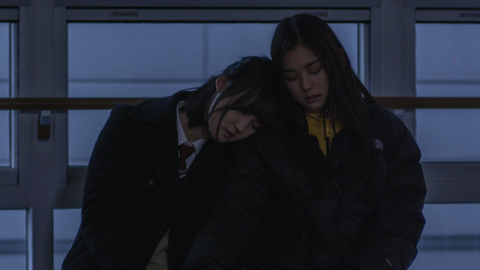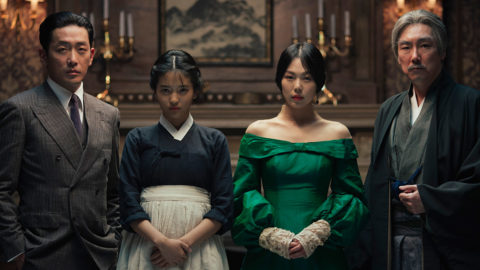Festivals: Busan

Hit the Night
No other film festival in recent memory has faced such a perfect storm of organizational and political difficulties and setbacks as the Busan International Film Festival (BIFF) has over the past three years. Yet it can’t be sunk so easily. While iconic co-founder Kim Dong-ho’s decision to step in as the chairman was controversial—especially since it happened after the ousting and prosecution of then–festival heads and founding members Lee Yong-kwan and Jay Jeon—it did allow BIFF to not skip a year. In a highly competitive festival landscape, that would have likely had an adverse effect, especially on indie filmmakers from Korea and other Asian countries who have come to rely heavily on BIFF for exposure and support.
So against the odds, the fest’s organizers pressed on with the 22nd edition, which included 300 short and feature films from 75 countries, including 100 world premieres and 29 international premieres—and it’s all to the credit of its dedicated staff, including BIFF’s World Cinema programmer Jin Park, who reported in surprise that “somehow, the fest managed to make this year much better than the last. The number of audiences has risen from about 160,000 to just shy of 200,000, which is about 20,000 less than the highest attendance in the festival’s history.”
But the lack of participation from established Korean directors was visible: industry organizations, including the Directors Guild of Korea, have been boycotting the festival since 2016, and major Korean studios decided to forgo throwing big parties featuring top K-pop acts, opting instead for more low-key gatherings. BIFF made up for it by bringing in heavyweights from other countries, including John Woo, Oliver Stone (head juror for the New Currents Award), and Darren Aronofsky. But the overall mood was understandably less festive, with many events paying tribute to the longtime head programmer and festival co-founder Kim Ji-seok, whose untimely death in May during Cannes was another blow to the struggling Korean festival.
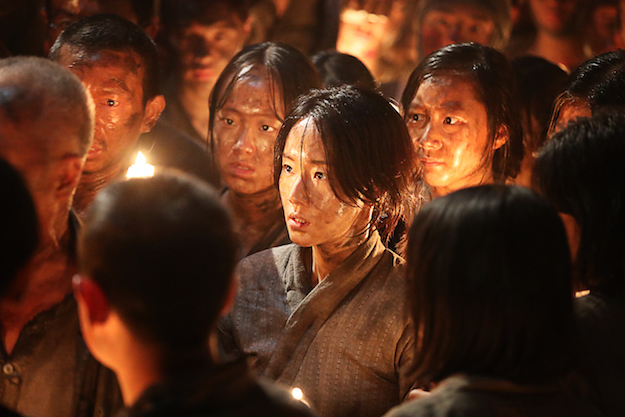
The Battleship Island
Among the most satisfying experiences was the World War II drama The Battleship Island, from Korea’s action maestro Ryoo Seung-wan (The Berlin File). Based on the true story of Korean forced laborers who worked under harsh conditions at the Hashima Island coal mines from 1930s through the end of the Second World War, the film was a box-office success upon its release, though it was criticized by the international press for being too nationalistic and for its negative, one-dimensional portrayal of the Japanese.
That’s a valid comment—if one was expecting a Spielberg-style history lesson. However, Ryoo has made a pure prison-escape film, in which the Japanese authorities are the resident bad guys, and the real conflict is between the Koreans who oppose the Japanese and those who collaborate with them—a clear nod to the political divisions that still exist in Korean society. Ryoo’s staging and direction are impressive, as he skillfully navigates the story through increasingly complex and visceral action setpieces, with great command of the space, and ratchets up the tension as the film races toward its climactic showdown, which is set to Ennio Morricone’s “The Ecstasy of Gold” and sprinkled with exploitation-style disposals of the chief baddies.
Even more accomplished was the riveting historical drama A Taxi Driver, which is South Korea’s official submission for the Academy Award for Best Foreign Language Film, and very much worthy of Academy’s attention. Set in 1980 during the rule of strongman Chun Doo-hwan, it’s inspired by the true story of a Seoul taxi driver who was able to sneak a German TV reporter in and out of the lockdown city of Gwangju, in the midst of the May 18 Democratic Uprising and its brutal and bloody suppression. The event was pivotal in South Korea’s struggle towards democracy, and the film is yet another example of Korean filmmakers effectively using their country’s past to comment on the present.

A Taxi Driver
Director Jang Hoon (The Front Line, Rough Cut), who developed under the tutelage of maverick Kim Ki-dook (Pietà, 3-Iron), has become a fully formed filmmaker in his own right, albeit a more commercial one. Effortlessly moving between depictions of daily life, sprinkled with humor and warmth, to extraordinarily heartbreaking events (without straying into melodrama) and taut action sequences, Jang provides actor Song Kang-ho (Snowpiercer, The Host) another opportunity to prove that he’s one of the finest character actors working in Asian cinema today. Song, playing the titular taxi driver and a single father of a preteen daughter, becomes the key observer of the Uprising and a symbol for the awakening democratic consciousness of the nation. We follow his nuanced transformation from someone who stays out of politics and believes in the government, to becoming willing to risk everything to fight for the just cause and to ensure that the news of the massacre gets out to the world.
During the festival’s early years, BIFF had great success in putting the New Korean Cinema on the map, but these days, most of mainstream Asian cinema is playing it safe, offering well-made but by-the-numbers productions, as epitomized by the serviceable May-December romance Butterfly Sleep. A decidedly commercial-minded return to filmmaking by Jeong Jae-eun, whose critically acclaimed coming-of-age tale Take Care of my Cat (2001) provided Bae Doona (TV’s Sense8, Cloud Atlas) with her breakthrough role, Butterfly Sleep was made for the regional market’s consumption. It follows a successful novelist (singer-actress Miho Nakayama of Shunji Iwai’s Love Letter fame) with early-stage Alzheimer’s, who starts a relationship with a young Korean student working at the local izakaya (tavern). There’s nothing new to see here and at best it’s a pleasant yet forgettable diversion for the fans of the genre, anchored by Nakayama’s performance.
Even films featuring men (and women) shooting guns while suspended in mid-air aren’t what they used to be. With the Osaka-set actioner Manhunt—a remake of Junya Sato’s popular 1976 Ken Takakura–starrer of the same name, which was a big hit in Mainland China—John Woo made another trip to the land of gun-fu. A top corporate lawyer (Zhang Hanyu) is framed for a murder and while on the run is pursued by the local police inspector (Masaharu Fukuyama) and a duo of highly trained assassins (Ha Ji-won and Woo’s daughter Angeles) who are controlled by a big pharma/mad-scientist James Bond–style villain (Jun Kunimura).
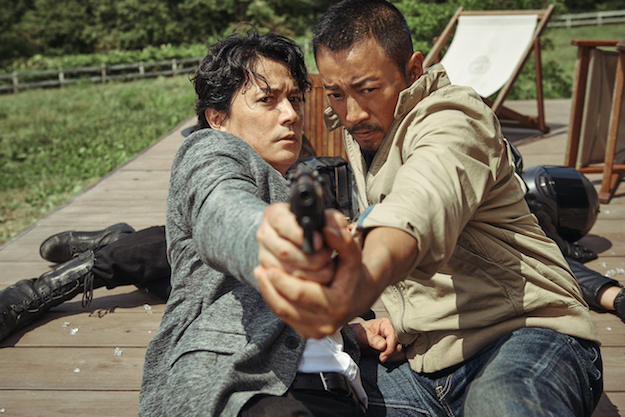
Manhunt
Sounds great on paper, and I would probably be less critical if this wasn’t a John Woo movie, but the result is disappointing, with an underdeveloped script and characterizations (there are seven credited screenwriters!), and plenty of borderline parodic self-references that fall flat. Though their characters’ bond is supposed to be the emotional core of the film, Zhang and Fukuyama lack chemistry, and they both struggle speaking lines of unnecessary English dialogue. While several of the action setpieces do deliver the thrills, nothing moves the genre forward, as Manhunt is ultimately a movie in search of its purpose.
While many established Korean and Asian directors debut their films at Berlin, Cannes, and Venice, BIFF is dedicated to presenting independent and low-budget cinema. For indie filmmakers in the region, the festival is the key platform to showcase their works and be discovered. In addition, BIFF offers programs that provide financial support for production and post-production (Asian Cinema Fund), training (Asian Film Academy), and networking, through the newly launched and well-received initiative, Platform Busan.
This year, the programming team also made an effort to increase diversity by selecting more works from women directors, including, for the first time, the opening- and closing-night films—definitely a step in the right direction. With festival opener Glass Garden, indie writer-director Shin Su-won (Madonna, Pluto), one of the leading female voices in Korean cinema, continues to look at the dynamics between the powerful and the marginalized in the contemporary socioeconomic system, but this time moves into the realm of fantasy. The film follows a quiet biotech scientist with a leg disability, Jaeyeon (A Tale of Two Sisters’s Moon Geun-young), as she experiences betrayal in love and the appropriation of her research work by a colleague. In response, she withdraws further from the world by retreating deep into the forest to continue her research of combining human and plant life, with unexpected results. A struggling novelist begins following and observing her, as an inspiration for his writing.
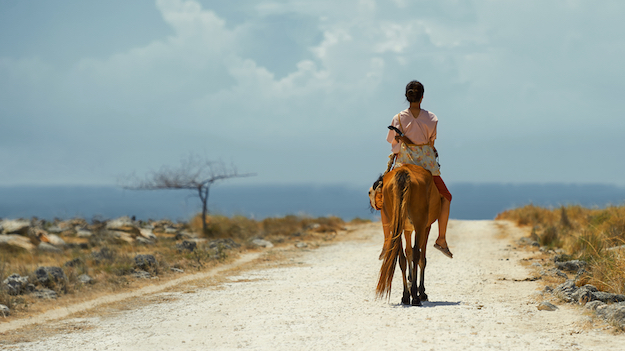
Marlina the Murderer in Four Acts
While Glass Garden suffers from lacks of coherent narrative and focus, to the detriment of dramatic tension, it is a work of unique originality, with lyrical and almost fairy-tale-like qualities in its look and feel, mixing elements of romance, fantasy, and even body horror, all with an underlying criticism of science serving the interest of corporations instead of common good.
Angie Chen’s portrait of the Paris-trained Hong Kong abstract painter, art director, writer, and blues musician Yank Wong, I’ve Got the Blues, is among the best recent documentaries about the nature of creativity and the complexities of being an artist. Known in the film world for his work on movies by Derek Yee (The Lunatics), Ann Hui (Summer Snow), and Lawrence Ah-Mon (Queen of Temple Street), Wong lives a modest existence, following his own code, outside of the system. He’s also an uncooperative documentary subjects (e.g., he won’t allow himself to be filmed when he paints). As Chen attempts to tell the story of his career and complicated family relationships, Wong keeps resisting her efforts to define him, and to “direct” him, as the two, along with other friends from the underground art community, engage in lively and illuminating wine-fueled discussions, and sometimes heated arguments, across local hangouts in Hong Kong and Macau.
Marlina the Murderer in Four Acts, the third feature from Indonesian writer-director Mouly Surya (What They Don’t Talk About When They Talk About Love) sits in that sweet spot between genre and art-house cinema, and is a pitch-perfect feminist response to patriarchy, more than appropriate for the current age of toxic (and immature) masculinity. Originally premiered at Cannes in Directors’ Fortnight, the film is a contemporary Western rooted in Indonesian culture, in which newly widowed Marlina (Marsha Timothy) seeks justice, revenge, and redemption, after being raped and robbed of her livestock at the hands of local bandits. Deliberately paced and beautifully shot, and featuring sudden and brief acts of purposeful violence, the film is a powerful indictment of the world that men have created, and a tribute to the strength and determination of women to survive in it on their own terms.
Also worthy of mention is Hit the Night, the sophomore feature by writer-director Jeong Ga-young (Bitch on the Beach), which cements her reputation as the younger, female version of Hong Sangsoo. With witty dialogue and views on sexuality from distinctly female perspective, Jeong, who plays herself in the film, actively pursues a man she’s interested in by auditioning him for a role in a movie that she’s pretending to be making.
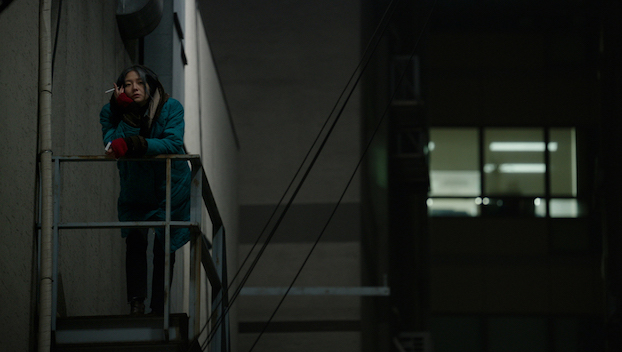
Microhabitat
The most impressive feature debut in the festival was Jeon Go-woon’s Microhabitat, which stars actress-model Esom as a college dropout, Miso, who makes a living as a housekeeper. As her monthly expenses increase, she’s not willing to give up on her two small pleasures in life: cigarettes and whiskey. Instead of continuing to pay the rent, she decides to pack up her modest belongings and see if any of her old college friends would be willing to put her up. But her friends, being at the various stages of careers and relationships, all have unique circumstances that make it impossible for Miso to stay for extended periods of time. In other words, Miso’s old friends no longer have room for her—physically and metaphorically—in their busy, complex lives.
While Microhabitat is a playful film guided by confident direction and great performances, its biggest value may be in questioning the mode of existence encouraged as the only way to live in the highly competitive Korea, where people are driven to achieve wealth and status symbols as a way toward ever-elusive happiness. In the end, and in the contrast to her college friends, Miso is perfectly content without any grand ambitions, as she lives in the moment, enjoying the time that she spends with her boyfriend (until he follows his career ambition and has to spend several years working overseas), smoking a cigarette, and drinking a glass of whiskey. Life can be simple, but it’s usually the demands that we place on ourselves that make it complicated.
While the political winds are finally blowing in BIFF’s favor—the new progressive president of South Korea, Moon Jae-in, visited the festival to show his support—many organizational issues remain. They will hopefully move toward resolution when the Board of Directors meets in an emergency session in early December. The key decision to be made is who the next leaders will be, in place of the outgoing chairman Kim and the festival director Kang Soo-youn.
One option would be to undo injustice, and reinstate Lee Young-kwan and Jay Jeon, although Lee has publicly stated that he would not be interested in returning. While Jin Park has said that “it seems like the fest will possibly have its leader from the industry, someone new,” he’s also quick to add, “but really, who knows?”—which sums up the unpredictability of the selection process.
But given the symbiotic nature of the relationship between BIFF and Korean cinema, it will be critical for the new festival heads to have the respect and full support of the domestic film industry. BIFF has staked out a unique position in the film-festival world, its future is closely tied with Asian cinema. It will be up to the new leadership to capitalize and build on the festival’s strengths, while making necessary adjustments (e.g., becoming leaner and more focused in certain program areas wouldn’t be such a bad thing) in order to continue to live up to being “a hub of Asian Cinema.”
Goran Topalovic (@goranfilm) is a New Jersey–based film curator and writer. He’s the co-founder of Subway Cinema and the New York Asian Film Festival.



